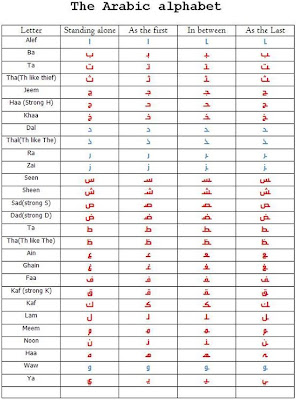
vary according to students' needs and the form of the language being taught. Communication is stressed and attention is given to all the four skills: reading, writing, speaking and Iistening. A.S.M believes that learning should be enjoyable and interactive. For beginner students who do not know how to write in Arabic, an extra 15 minutes per day is added to your course to help you.

The teaching methods used at A.S.M are based on the Audio-Lingual Method with a Communicative approach. This effective method and this approach have been proved successful in foreign language instruction worldwide.
Instead of using an intermediary language in teaching foreign language, the Audio-Lingual method requires that only the target language to be used in classroom instruction as well as in study. This method gives equal attention to the development of all the four language skills, starting with Listening, then focusing on Speaking, Reading, and Writing. This method proved highly successful that the student starts speaking Arabic immediatel.
The Communicative approach aims at making the student communicate using the target language in real situations. Al Diwan team works hard all the time to creat many real situations outside the classroom for every student, through acquaintanceship, activities, groups, visits, phone chats, short and long trips, and the exchange of tapes and other live media.
A.S.M also uses numerous teaching aids to improve the learning environment. These aids include: reading selections from various genres, pictures, comic strips, posters, cards, audio tapes, CDs, video tapes, local and international Arabic magazines and newspapers, and recreational trips.
With the help of these and other aids, learning Arabic becomes incredibly enjoyable, easy, and appealing to the student.
words in English
You may think you don't speak Arabic but there are more words of Arabic origin in English than you might expect ...
| admiral | carob | jinn | popinjay |
| adobe | casbah | kafir | racket |
| alchemy | check | khamsin | safari |
| alcohol | checkmate | khan | saffron |
| alcove | cinnabar | kismet | saloop |
| alembic | cipher | kohl | sash |
| alfalfa | coffee | lacquer | scallion |
| algebra | copt | lake | senna |
| algorithm | cotton | lemon | sequin |
| alkali | crimson | lilac | serif |
| almanac | crocus | lime | sesame |
| amalgam | cumin | lute | shackle |
| aniline | damask | magazine | sheikh |
| apricot | dhow | mahdi | sherbet |
| arsenal | dragoman | marabout | shrub |
| arsenic | elixir | marzipan | sirocco |
| artichoke | emir | massacre | sofa |
| assassin | fakir | massage | spinach |
| aubergine | fellah | mastaba | sudd |
| azure | garble | mate | sufi |
| barbarian? | gauze | mattress | sugar |
| bedouin | gazelle | mecca | sultan |
| benzine(?) | ghoul | minaret | sultana |
| Betelgeuse | Gibraltar | mizzen | syrup |
| bint | giraffe | mocha | tabby |
| borax | grab | mohair | talc |
| cable | guitar | monsoon | talisman |
| calabash | gypsum | mosque | tamarind |
| calibre | halva | muezzin | tambourine |
| caliph | harem | mufti | tarboosh |
| camel | hashish | mullah | tare |
| camise | hazard | mummy | tariff |
| camphor | henna | muslim | tarragon |
| candy | hookah | muslin | Trafalgar |
| cane | imam | myrrh | typhoon |
| cannabis | influenza | nabob | vega |
| carafe | jar | nacre | vizier |
| carat | jasmine | nadir | wadi |
| caraway | jerboa | orange | zenith |
| carmine | jessamine | ottoman | zero |
Our Methodology
While viewing Arabic as a bridge to the Islamic sciences, our program also approaches Arabic as a vibrant and living language, using an integrated approach that emphasizes a well-rounded knowledge of the skills of reading, writing, listening, and speaking. A.S.M conscientiously does not stress a "classical vs. modern" dichotomy; instead, it focuses on the intersections and continuities between classical (fus'ha) Arabic and Modern Standard Arabic. Though our training places a strong emphasis on acquiring a solid foundation in classical Arabic grammar, this is not at the expense of developing smooth conversation and reading skills. Heavy emphasis is placed on building students’ speaking abilities, and the Arabic-Only Immersion Policy is geared towards this objective.